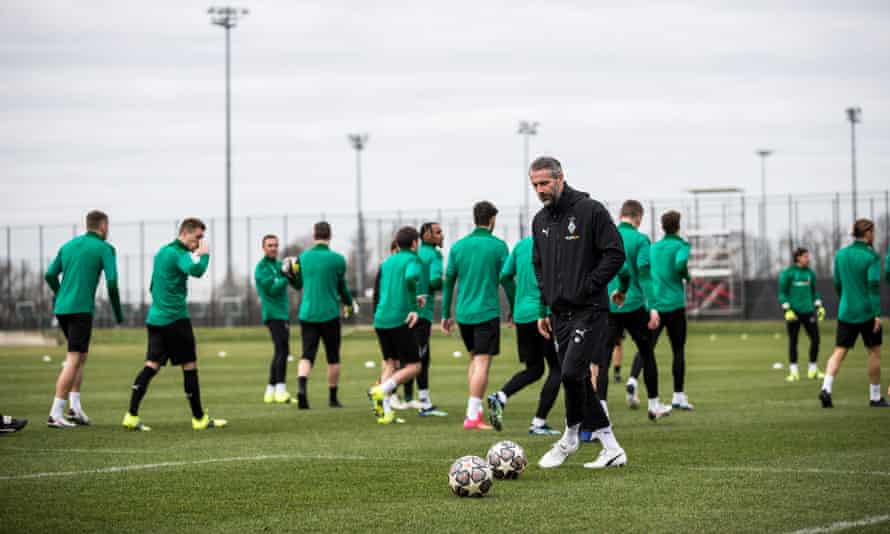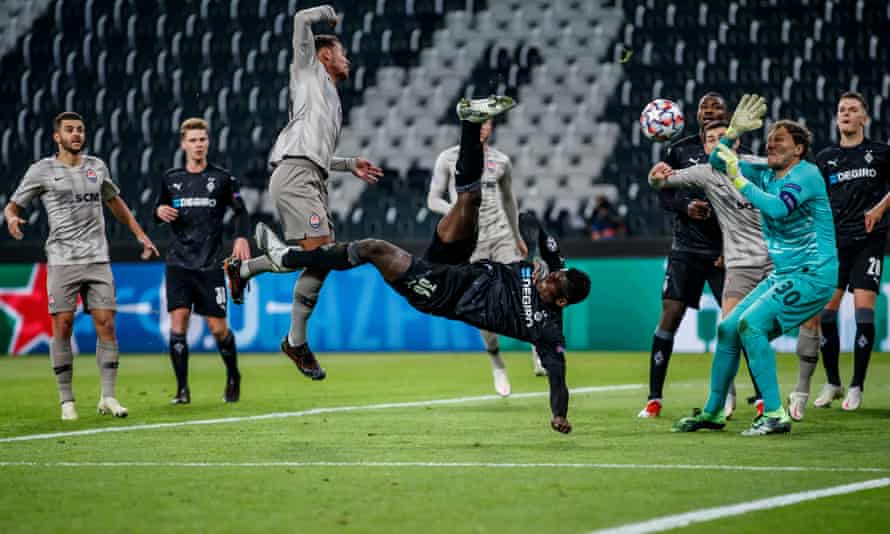In order to understand Marco Rose, the best place to start is towards the end of an extensive interview and the most open of questions. How would he describe the blueprint for one of his teams?
“A Marco Rose team?” He does not really need to think. “It’s always active in a game, against the ball and with the ball. It tries to win balls in a high position on the pitch. If we have the chance to score quickly we should use it, if not we should keep possession but not so that we start to sleep. Moving the ball fast, moving the opponents; winning it back in the shortest possible time if we lose it. Playing clever, playing hard, not just for the gallery. Always convinced about every teammate, and always with the belief that we have a chance to win against anyone.”
The vision would stand up well in a job application, although Rose will not be submitting one of those any time soon. A couple of weeks after this conversation his summer switch from Borussia Mönchengladbach to Borussia Dortmund is confirmed; it is no big surprise and, raking back over the recording, there are a few places where a minor hint might be understood after the fact. Rose is one of Europe’s hottest managerial properties and among its fastest risers, too.
Four seasons ago he was coaching Red Bull Salzburg Under-18s, defeating Manchester City’s youngsters en route to winning the Uefa Youth League. Now he has earned a crack at their senior side in the Champions League with Gladbach, whose famous old name has been restored to lights on his watch. His first season brought a fourth-placed finish in the Bundesliga and today they contest a last-16 tie for the first time in 43 years. Rose’s side qualified for the knockout stage in December, finishing second in Group B behind Real Madrid and knocking out Internazionale on an impossibly tense final matchday. Their football is exactly as trailed: fast, flexible and dynamic; a product of the modern Germano-Austrian coaching tradition whose clout at the highest level is inescapable.

“I’ve never had a career plan,” Rose says. It has not been an orthodox path to the top but some of the sliding doors moments have gone his way. Take the moment in 2002 when, as a bit-part defender under Ralf Rangnick at Hannover, he could choose between VfB Lübeck or a Mainz side managed by a callow Jürgen Klopp for the next step of his career.
“My first thought was: ‘OK, Lübeck, up by the sea, nice place, good coach, maybe a better life to play football,” he says in good English that, despite his modesty, comes alive the more he warms to a subject. “Then I thought I would talk with Jürgen. We met in the Mainz team hotel and by the time we finished I had decided not to go to the sea. That’s what I think makes Kloppo special: that he can convince you about his ideas and the club. It was clear for me to join Mainz.”
Rose and Klopp still talk regularly, although he maintains football does not dominate their calls. They have in common a glint in the eye, a wink here and there, a lighter touch beneath some of the more earnest expositions. They spent six years together at Mainz so Rose would hardly disavow Klopp’s influence – “of course you use some ideas of his; a couple of things I do in training we did at Mainz” – but he regards himself as more of a bricoleur. Rangnick impressed upon him, at a young age, the benefits of using a back four and would later preside over his arrival at Salzburg. A couple of years with Thomas Tuchel after Klopp’s departure planted seeds. “But at the end you have to be convinced of what you are talking about with your players, what you show them, what you ask from them,” he says. “So you have to create your own style.”
It was not all about learning from success stories. Rose says he was more interested in leadership than finer tactical details as a player; he honed that skill enough to be appointed assistant coach to Mainz’s reserves as his playing days wound down. His first spell as a number one, down in Germany’s fourth tier with his home town club Lokomotiv Leipzig, stretched his powers to the full.
Rose loves Lokomotiv, who were briefly a European force before the fall of the GDR. He played for them until he was 23, his path set by the exploits of his East Germany international grandfather, Walter Rose, and a footballing father whose ability was “so-la-la … his biggest strength was his tackling”. But he felt alone while spinning plates for the troubled club. “I could only talk with myself about football,” he remembers of that 2012-13 campaign.

Red Bull Salzburg was the cure for that. It would be for anyone, because the energy drink company’s network of clubs bubbles away with a ferment of ideas and information exchange that leaves others trailing. Rose arrived as their under-16s coach but quickly stepped up to oversee the year group that were to conquer Europe. “I felt I could learn a lot there, have meetings, discuss things, make mistakes,” he says.
In 2016 he invited Rene Maric, a blogger-cum-coach whose work had made waves in the tactical analysis community, to join his staff. Maric stepped up too when Rose took over Salzburg’s first team a year later, moved on to Gladbach and will be among the legion joining him at Dortmund. Rose thinks a manager at the top level must surround himself with experts. “If you are smart, you do that,” he says. “I think I know a lot about football, but you have to use specialists and let them do their job. There are people who know a lot of things better than you. If you think you know everything and you are the best, I think you will get problems.”
For Rose, the bottom line in working with the modern footballer involves communication. It is not through inadequate vocabulary that the word “convince” peppers so many of his answers. “Players today are starting really fast to think about what the coach is asking for, what he means,” he says. “It’s not like 10 or 15 years ago when they just did what they were told. Now you have to explain very well what you want them to do and why. You need good football knowledge but on the other side a big part is to feel with them, to have empathy.
“The most important point is to convince them: not just about playing football, but about everything that you do. The way you work is the way you play. Happiness is one part of a good atmosphere in the locker room but so is honesty. If someone makes a mistake you have to tell him: ‘Hey, that’s not us, we are different.’ It means having a lot of fun, but being honest and straight.”
That approach took Salzburg to the Europa League semi-finals and has paid off at Gladbach. They drew with Real and Inter in the Champions League, also thrashing Shakhtar Donetsk twice, but had to wait on the Bernabéu pitch to receive confirmation of the draw between the Italian and Ukrainian sides that would send them through to face City. The players huddled around an iPad before erupting in celebration; Rose, meanwhile, was too preoccupied by a flat 2-0 defeat.
After losing vs. Real Madrid, Gladbach needed Shakhtar Donetsk to draw with Inter Milan to secure their place in the #UCL knock-out stages.
They watched the last few minutes on a tablet at the side of the pitch until the final whistle...
Scenes 😂 pic.twitter.com/xqcwYfBZyE
— Football on BT Sport (@btsportfootball) December 9, 2020
“I was in the locker room, really disappointed about the result and with our performance, and I only thought 10 or 12 minutes afterwards: ‘Has it finished in Milan or are they still playing?’ We lost the game but the guys celebrated like we won the Champions League. It’s really special for us.”
Ending City’s hot streak would be more remarkable still and might calm a few sensibilities domestically given Gladbach, who lost 2-1 at home to Mainz on Saturday, are in a mini-slump that partly coincides with Rose’s decision to head onwards and upwards. Eyebrows will be raised well beyond Dortmund if they do topple Pep Guardiola’s team. England might be a logical next step if, down the line, he emulates Klopp and Tuchel there.
“I never sit at home and think: ‘In 10 years I want to be coach of Man United or Liverpool,’ he emphasises. “Of course if I have time to think about it, maybe it’s interesting to be a coach once in the Premier League. But I feel very well now in Germany, in the Bundesliga.”
No direct mention of Gladbach: perhaps that was one of those clues. Either way, his current club will face City with chests puffed out. Rose’s concept knows nothing of the underdog.
The Fiver: sign up and get our daily football email.
“That’s not my thing. I don’t like to say we are the favourite because I always respect our opponents, and I don’t like to say others are the favourite because it makes you smaller. In football you always have a chance. You just need to be convinced about it, find a good idea and have a good plan. And of course you need a little bit of luck, too.”
from Football | The Guardian https://ift.tt/2ZHDbXa
via IFTTT

No Comment